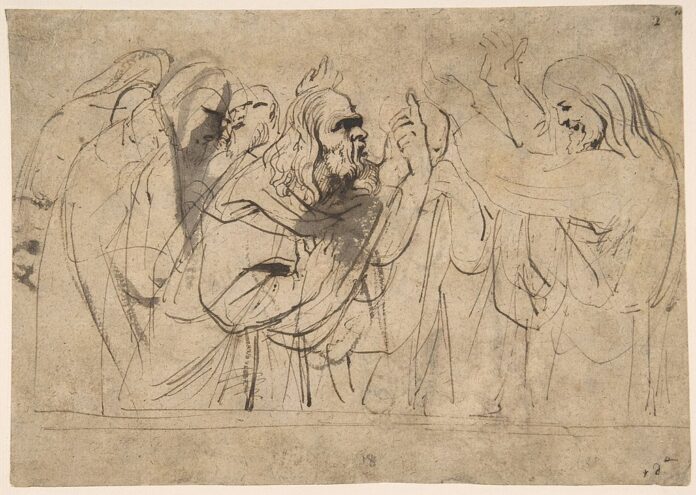Sam Harris, on his latest tour, recently claimed that with a few psychedelics, his genuine instruction on how to attend to the nature of one’s mind, and proper meditative practice, we would no longer need the Bible—nor regard it with such reverence. For Harris, understanding scripture as the word of God is incompatible with true contemplative wisdom—wisdom that he purports to access through the right psycho-spiritual tools. In this framework, Christian contemplatives, for example, are thus simply walking an unacknowledged path toward Buddhism. Yet one must ask: Is Harris meaningfully different from the contemplative charlatans and spiritual mountebanks who preceded him? Does he genuinely advance the discourse on God and spirituality? Or has he become the very pseudo-enlightened sage he once dismissed, preaching to an echo chamber of feverish believers?
In intellectual pop culture, Harris is often regarded as a formidably intelligent “black belt” of reason—especially by his most ardent admirers. His popular 2014 book, Waking Up: A Guide to Spirituality Without Religion, invites readers on a psycho-exploratory journey built upon remarkably abecedarian, elementary, and overfamiliar arguments defending the divorce between spirituality and religion—arguments that might well have been composed by a precocious high school senior. This is not to say that Harris is anti-intellectual or uncredentialed; quite the opposite. He is undeniably erudite and impressively credentialed. Yet while possession of an adequate vocabulary and conceptual apparatus can buy one’s participation in sophisticated discourse, they do not guarantee that the lines of argument actually offer anything new to the discourse. In order to induce paradigm shifts, one must offer creativity, invention, novelty, imagination, neoteric production of ideas, innovation, or a general capacity to simply offer new insight. The idea and goal are to produce rather than reproduce ideas. Unfortunately for Harris, his credentials and his calm, logical cadence all contribute to an aura of profundity without offering much that is conceptually new or has not already been competently addressed by adept apologists. His claims are quite historically redundant and merely repetitive. His inability to contribute meaningfully to the marketplace of ideas is thus evidently obscured by his own intellectual hallmarks, a continued reliance on conceptual regurgitation.
Harris’s insistence that meditative practice, some light psychedelic experimentation, and introspection can liberate one from religious or spiritual tradition and orthodoxy is, in essence, a retelling of a centuries-old dialectic between East and West. The contemplative traditions of the East have long stood in philosophical opposition to the Abrahamic traditions of both the Middle East and the West. Thus, when Harris repeatedly claims that Christian contemplatives need only learn how to “properly” attend to their minds to free themselves from loyalty to ancient scripture, wisdom, and canon, he does not move the discourse forward; he merely rearticulates an old tension in a contemporary formulation. There is nothing wrong with subscribing to a psycho-philosophical worldview and a set of spiritual practices, as Harris does, but the greater discursive landscape around these interesting debates of antiquity is not further along.
Curiously, whether Harris realizes it or not, his fixation on this irreligious spiritual liberation through disciplined, authentic contemplation renders it hard to differentiate him from the spiritual entrepreneurs who came before him. He is, in effect, a contemporary Alan Watts, Anthony de Mello, or Jiddu Krishnamurti. To be fair, profound truths exist within the teachings of all these figures. In fact, they can be exceptionally fun to read, provided the proper framework is applied. Yet like them, Harris preaches a nirvana-like state, an awakening, and an enlightened state of practical utility defined vaguely through psychological or spiritual improvement. He has become precisely the kind of “guru” or modern-day “sage” he so vehemently denounces—only his gospel is cloaked in the language of logic, alleged measurable practicality, pragmatism, veritably, objectivity, and rationality.
The wise sage, across traditions, presents a formula for spiritual advancement: the Zen master through paradox and koan in an effort for satori, the mystic through ascetic awakening, the rationalist through disciplined introspection. De Mello implores us to “wake up” from convention; Watts counsels detachment and playfulness as the road to enlightenment. Krishnamurti implores you to drop all political, cultural, religious, and spiritual labels, categories, and everything that you conventionally know to avoid psychological stagnation and decay. Harris, for his part, invites his followers to practice diligently using his psycho-spiritual toolkit—often, conveniently, through his meditation app—to achieve illumination and freedom. In each of these frameworks, the metaphysically existential weight of our condition is placed squarely on the individual. The cosmological bewilderment of our existence should, as Harris rightfully notes, take our breath away. But where this awe once gestured toward the transcendent—toward faith in the divine—Harris redirects it inward, into an individualized, marketable form of contemplative self-sufficiency. His vision of “waking up” ironically leaves one not with revelation, but with a neo-subscription.
In sum, as evident via his current tour, Harris continues to recycle the same perennial arguments in the ancient debate over spirituality and transcendence. He merely rebrands them with the rhetoric of logic, science, practicality, measurability, and objectivity. A few psychedelic experiences, some guided introspection from his app, and the disciplined application of his meditative techniques—and the Bible, Harris claims, will fade into obsolescence. It is a bold promise from a man who disabuses, rebukes, and disavows nearly every other spiritual leader as inauthentic, disingenuous, or misguided.










